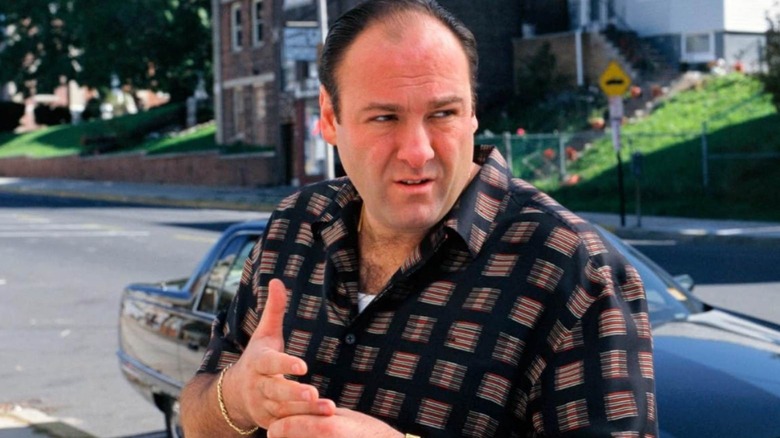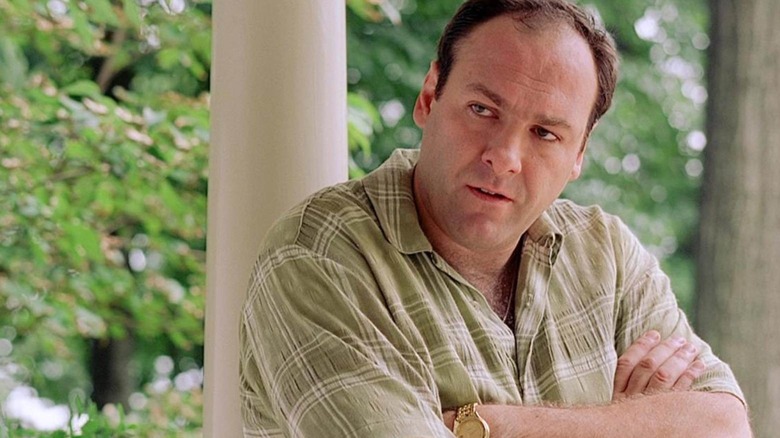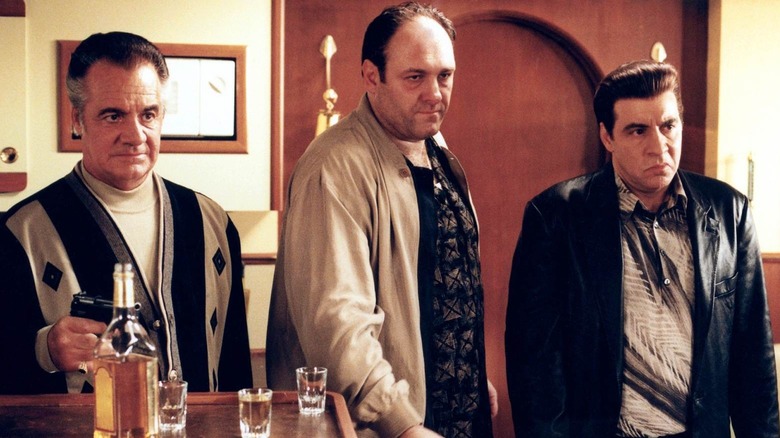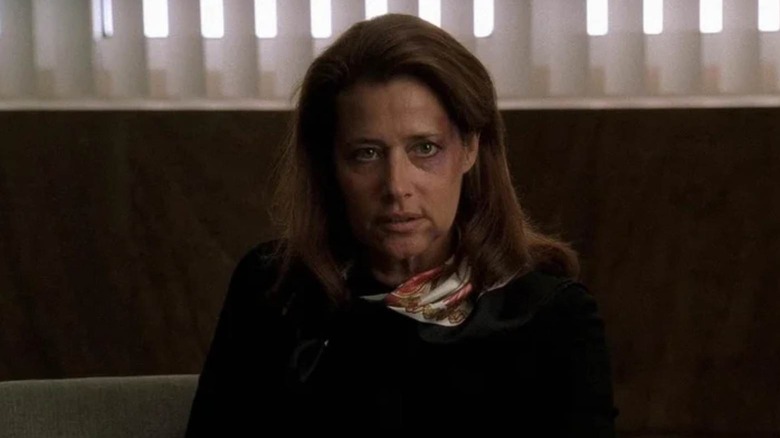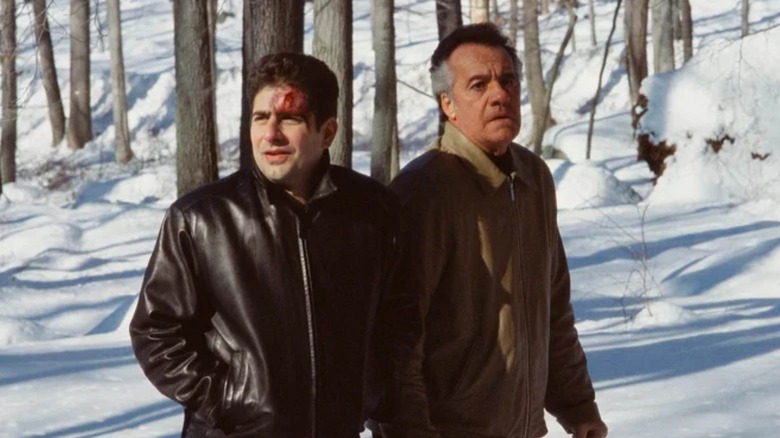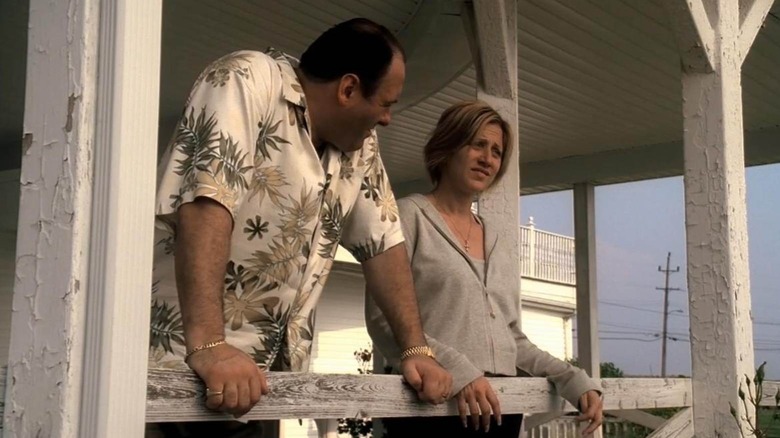5 Essential The Sopranos Episodes That Everyone Should Watch At Least Once
It's almost 18 years after the final episode aired, and yet somehow, there are an unfortunate bunch who still haven't seen a single episode of "The Sopranos." We get it. Perhaps given the universal acclaim, the life (and maybe death?) of Tony Soprano (James Gandolfini) is a bit daunting. What if you finally sit down to watch what many deem the greatest television show ever made and think you don't like it? What if it suffers from that classic ailment of "taking a few episodes before it gets good"? Well, worry not; after thoughtful consideration and mountains of gabagool, we've carefully picked a quintet of ideal episodes from David Chase's television masterpiece that will make you realize nothing is more important than family and dreams about talking fish.
From brutal moments of treachery to brilliantly funny standalone episodes, these are five extra-special chapters of what became a staple of storytelling and changed how television was made from then on. Admittedly, for the uninitiated, some of the entries on this list might include spoilers, but hey, whaddya gonna do? We've paid our respects to the boss and made sure that this perfect batch of episodes will make you realise just how much you've been missing out on. So get in some time with Tony and the family and see why "The Sopranos" really is the benchmark that only a handful have managed to meet since.
Pilot
It may be an easy choice, but there's no doubt that one of the best episodes to watch to get your lay of the land in "The Sopranos" is the first. A little rough around the edges, it still didn't prevent the initial introduction to Tony Soprano and both of his families from being an installment that hooked you.
From his private initial therapy session with Dr. Melfi (Lorraine Bracco) to his duck obsession that would linger for years to come, Tony's view of the world and his control over it were compelling from the start, as were the good, bad, and ugly characters that filled it. It highlighted the brilliantly duplicitous relationship between him and the elders he cared for deeply. Besides his Uncle Junior (Dominic Chianese) keeping a watchful eye on his up-and-coming nephew and the struggle unfolding between them, the real threat wasn't the mob empire he was part of, but the show's greatest villain and arguably one of the best television has had the displeasure of hosting: Nancy Marchand as Livia Soprano, Tony's own mother.
It's easy to see how Chase originally envisioned Livia Soprano as a source of endless problems for Tony until Marchand's untimely passing. In the first episode, we catch a glimpse of the kind of trauma she unleashed on her son that would linger even after her death. This dynamic proved "The Sopranos" was about more than just the mob; it was about families and the frayed, fighting bonds that connect us to them, and it was only just beginning.
Funhouse
Some of the greatest moments in the history of "The Sopranos" are when some of its best characters are out for the count. Chase crammed the show with dream sequences that portrayed the fears and secrets of the captains and soldiers within the Sopranos family, which were rarely spoken about with each other. One episode that handles this brilliantly is "Funhouse," which saw Tony succumb to food poisoning and dream up truths that up until now he'd done his part to try and ignore. After already taking out one rat earlier in the season, Tony accepts and later confirms that Pussy Bonpensiero (Vincent Pastore) is an informant working for the FBI, and deals with it accordingly.
It marks the first significant choice made by Tony that would haunt him in the years that followed, sending his paranoia levels into new realms whenever a whiff of the law was on him. It's also one of the most emotional exits of a character. It's a testament to the show at this point that as much as Pussy's fate was inevitable, it doesn't make his death any easier on the family, or us as viewers, demonstrating Chase's masterful ability to turn some of its most despicable characters into likeable ones and all round good fellas that feel like actual losses when they meet their end.
Employee of the Month
Perhaps the most compelling element in the show wasn't the standard affairs of a struggling mob boss but the private thoughts and frustrations he shared with his therapist, Dr. Melfi. The more time spent in that office, the more layers were peeled back, not just with Tony but also with the therapist who was both feared and fascinated by him. Of all the women that walked in and out of Tony's life, Melfi's relationship, besides the one he shared with Carmela (Edie Falco), is the most intriguing to see, and made all the more so in the harrowing fourth episode of the show's third and deemed perfect season, "Employee of the Month."
Up until now, we'd always been given glimpses into Melfi's life, but here we spent the most time with her in one of her traumatizing moments. After walking to her car after work, Tony's therapist is sexually assaulted by an unknown attacker, and while in recovery, she battles with the choice to tell her patient what's really happened. To do so would ensure that a different kind of justice is served, but it could also make her no better than the monster she is battling to tame every week. It leads to a perfectly bleak ending, highlighting Melfi's place in Tony's world and her lengths to keep her distance from it, regardless of what that can mean for her in the long run.
Pine Barrens
Ask any self-respecting fan what their favorite episode of "The Sopranos" is, and you can bet a frozen packet of mustard they will say "Pine Barrens." Directed by Steve Buscemi (who would eventually appear in the show as Tony's cousin, Tony Blundetto), it might well be the only episode needed to really show someone what all the fuss is about, and they're guaranteed to have a few laughs during their discovery.
Playing like a bottle episode, Paulie (Tony Sirico) and Christopher (Michael Imperioli) are tasked with making a collection that spirals out of control. From there, they find themselves lost in the titular spot after failing to bury a mistake they've made, which may only exacerbate things for Tony. As the night carries on, things only get worse for two of Tony's most disastrous lackeys, who find themselves fighting over ketchup and relish packets to keep them going. But with the hilarious moments that are sprinkled throughout the episode and the miscommunication between all three parties, more concerning details reveal just what other problems Tony is having to deal with.
As much as Ton' might have a dedicated operation under his disposal, "Pine Barrens" provides the clearest picture of some of its key players and just what they're really capable of when worst comes to worst, and that some of the key crime family members are always out for themselves in the end. Above all, it also impressively tees up one of the show's most beloved unanswered questions of how a Russian interior decorator got away and was never seen again.
Whitecaps
Tony has plenty of plates to spin during his time as boss, but the one that proves to be the most difficult is keeping his work in "waste management" away from his home life. That all comes to a head in "Whitecaps," where Tony and Carmela revel in their family and the foundation they've laid for themselves, only for it to come tumbling down thanks to one drunken phone call.
While Tony is out, his vengeful goomar, Irina, phones the Sopranos' residence and tells Carmela about their lengthy affair. What follows is one of the most realistic, explosive arguments between a couple ever caught on screen, bubbling with ferocity and hatred. It's a testament to not only Gandolfini's consistently brilliant performance as Tony but also Edie Falco's ability to match him pushing each other's buttons that is gut wrenching to see.
Rage, tears, spite, and heartache flood through one of the most impressive moments in the entire show, proving that "The Sopranos," is about so much more than a man who's married to the mob. It's about the unfortunate souls who are drawn into his world, and that includes the woman who can live within "this thing of theirs" just as well as he can in the family that means the most to him.
